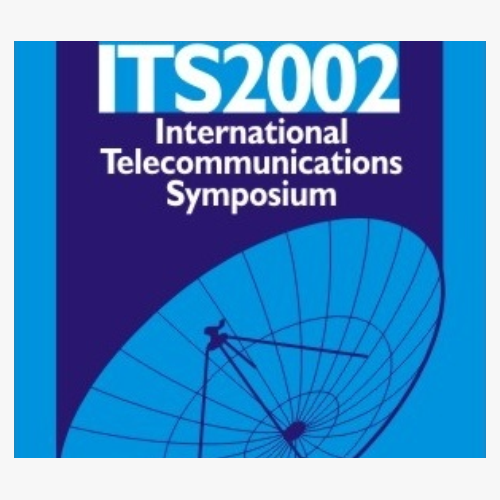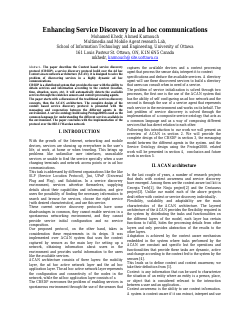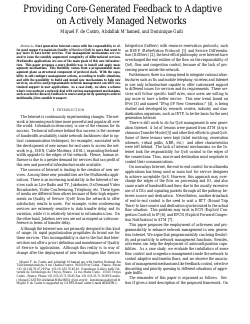
2002 International Telecommunications Symposium

Performance Evaluation of TDMA Receivers using Maximum Likelihood Estimation Techniques
Daniel B. Pretto, Waldecir J. Perrella
DOI: 10.14209/its.2002.656
Keywords:
Abstract
"The performances of three TDMA receiver structures, using Maximum Likelihood Sequence Estimation (MLSE), Block Sequence Estimation (BSE) and Per-Survivor Processing (PSP) techniques were evaluated. The criteria adopted for analysis was according the minimum performance specifications of the IS-55 standard for transmissions over flat fading and frequency selective channels. The results stated that the three structures analyzed reach the minimums specified partially and the PSP structure had a better performance, despite the higher computational load required in this method."Download

Improving simulation performance of Engset's multiservice loss networks techniques
Zdenko Vrdoljak, Josip Gracin, Mladen Kos
DOI: 10.14209/its.2002.662
Keywords:
Abstract
"This paper deals with performance improvement of event-driven simulation of multiservice loss networks by using Engsets’s customers model approximation. Model is based on simulation state modulated homogeneous Markov chain. The model obtains equal simulation results as direct model of group of customers. Simulation runs significantly faster, especially for large number of customers considered."Download

Resource Allocation in Switchlet Networks
Nelson L. S. da Fonseca, Antônio P. Castro Jr, Alexandre T. Rios
DOI: 10.14209/its.2002.668
Keywords:
Abstract
"In this paper, a method for resource allocation method in switchlet networks is introduced. The method is based on restricting the search space for the solution of a multicommodity flow problem The proposed approach is accurate, and amenable to real time implementation."Download

Network Management Using Mobile Agents
Jorge F. A. da Costa, Sergio V. Fialho
DOI: 10.14209/its.2002.673
Keywords:
Abstract
"This paper proposes a mobile agents based framework to implement the management of computer networks. The traditional approach used by SNMP is based on a highly centralized topology. For complex network computers, such a topology may cause overload conditions in the use of network resources during management activities. The adoption of mobile agents can provide for the lack of a manager-manager communication mechanism in the SNMP environment. A basic environment using the Aglets Workbench was developed, where a Mobile Agent was capable of carrying the SNMP management software and install itself in previously chosen machines in a net. Some tests were performed and they confirmed the viability and convenience of the proposed solution. Starting from the implemented framework, it is possible to build a complete system for Computers Network Management."Download

Enhancing Service Discovery in ad hoc communications
Mohamed Khedr, Ahmed Karmouch
DOI: 10.14209/its.2002.678
Keywords:
Abstract
"The paper describes the Context based service discovery protocol (CBSDP), a service discovery protocol build over the Ad hoc Context aware network architecture (ACAN), it is designed to solve the problem of discovering services in a highly dynamic ad hoc communications. CBSDP is a distributed system that provides the user with the ability to obtain services and information according to the context (location, time, situation, users, etc), it will automatically detects the available services through the existence sensors and context processing agents. The paper starts with a discussion of the traditional services discovery concepts, then the ACAN architecture. The complete design of the context based service discovery protocol is presented with the messaging and cooperation between the different agents in the environment. A service ontology build using Protoge2000 is used as the common language for understanding the different services available in the environment. The paper concludes with the implementation of the protocol over the 802.11 Wavelan network"Download

Optimizing Fuzzy Controllers with Genetic Algorithms for QoS Improvement
Marcial Porto Fernandez, Aloysio de Castro P. Pedroza, José Ferreira de Rezende
DOI: 10.14209/its.2002.683
Keywords: QoS DiffServ Network Provisioning
Abstract
"Most work on Differentiated Services (DiffServ) handles Quality of Service (QoS) provisioning on a per node basis, which assumes that this strategy would provide QoS in the whole domain. Nevertheless, this approach could fail in large domains with multiple flows aggregation and unexpected input traffic. Therefore, provisioning techniques should be used to avoid unpredicted overloads that result in QoS fluctuations. A proposal using fuzzy controllers to reconfigure DiffServ nodes according to ingress traffic and achieved QoS was presented in [1]. However, it is not easy to specify fuzzy rule bases and membership functions that optimize the controllers performance. Thus, we propose a methodology to choose optimized fuzzy controller parameters using the Wang-Mendel and genetic algorithms. Finally, we evaluate the performance of this methodology by simulation of voice over IP applications in DiffServ domains."Download

Efficient Fair QoS Control Using Stochastic Multiobjective Resource Allocation Strategies
Menotti Machado
DOI: 10.14209/its.2002.689
Keywords:
Abstract
"In this paper, we present a model to evaluate and to control the Quality of Service end-to-end (QoS) in packet networks by using optimal resource allocation techniques. This is done controlling the QoS for each Class of Service (CoS), subject to QoS requirements. We consider \ufb01xed trade-o\ufb00s among the QoS of the classes. Our QoS model is based on three traf\ufb01c performance metrics. We evaluate and compare six strategies to solve this problem by resource allocation. The technics based on stochastic multiobjective optimization allocated the network resources of form to supply good Network mean QoS values and fair CoS mean QoS values. The simulation was realized on an IP network considering a multiplexer placed on the network edge as the control dispositive."Download

Providing Core-Generated Feedback to Adaptive on Actively Managed Networks
Miguel F. de Castro, Abdallah M’hamed, Dominique Gaïti
DOI: 10.14209/its.2002.695
Keywords:
Abstract
"Next generation Internet comes with the responsibility to offer good support to maintain Quality of Service (QoS) to users that want to pay more to have better services. New management mechanisms are created to issue the sensibly augmented complexity of differentiated services. Multimedia applications are one of the main goals of this new infrastructure. This paper proposes a more flexible way to install and apply management mechanisms. This flexibility comes from a programmable management plane as structural component of protocol stack. With the capability to self-configure management actions, according to traffic situations, and with the possibility to build and install new mechanisms to help new services, an active and programmable network management can offer customized support to user applications. As a case study, we show a scheme where core nodes in a network deal with various management mechanisms, such as selective discard, feedback to source and priority queuing to achieve multimedia jitter-sensible transport."Download

End to end IP QoS assurance using policy based multi-agent SLA management systems
Mauro Fonseca, Nazim Agoulmine
DOI: 10.14209/its.2002.701
Keywords:
Abstract
"The development of Internet as well overall communication technologies has created a very competitive communication market. In fact, there is no doubt that every company and perhaps every person in the world will have an Internet physical or wireless access via ISPs (Internet Service Provider). Thus the Internet became a very complex worldwide network which objective it to provide not only connectivity to end user but also services with a certain QoS (Quality of Service). Although, the effort made by each ISP to provide this QoS, it is not very easy to provide this QoS from access point of the customer to the destination point. The main difficulties are the negotiation process between ISPs in order to agree for the terms of collaboration and the deployment and management of the network in order to satisfy these agreements. It is recognized now that Policy-Based Networking became a key concept to facilitate the deployment of management strategy in IP based networks. Although, already existing solutions, they can operate only in a particular domain while the customer request for an end-to-end deployment. Thus, it is necessary to extend this approach in order to integrate mechanisms that permit satisfy end-to-end SLA (Service Level Agreement) upon a number of administrative domains. Thus the objective of this paper is to propose a solution that allow the interoperability between various policy domains. The approach is based on mobile agents to facilitate the negotiation between the different domains. Customer or ISP Policy Based Management System delegate to a mobile agents the responsibility to negotiate the terms of SLA on their behalf . The mobile agent negotiate according to a set of policies defined by the Customer or the initiating ISP."Download

Wizard of Oz Evaluation of a Dialogue with Communicator System in Chile
Néstor Becerra Yoma, Angela Cortés, Mauricio Hormazabal, Enrique López
DOI: 10.14209/its.2002.712
Keywords:
Abstract
"Results of Wizard of Oz experiments with Communicator system in Chile are presented in this paper. The task was to book a domestic flight and was used to evaluate the user response to this type of system and, more specifically, to a diphone TTS implemented with speech samples from a Chilean speaker. Two synthesizers were employed, with and without pitch contour. The results suggest that the overall user attitude toward the system was positive. Moreover, a proper pitch curve seems to improve the intelligibility of the synthesized speech and_ the response to the system."Download